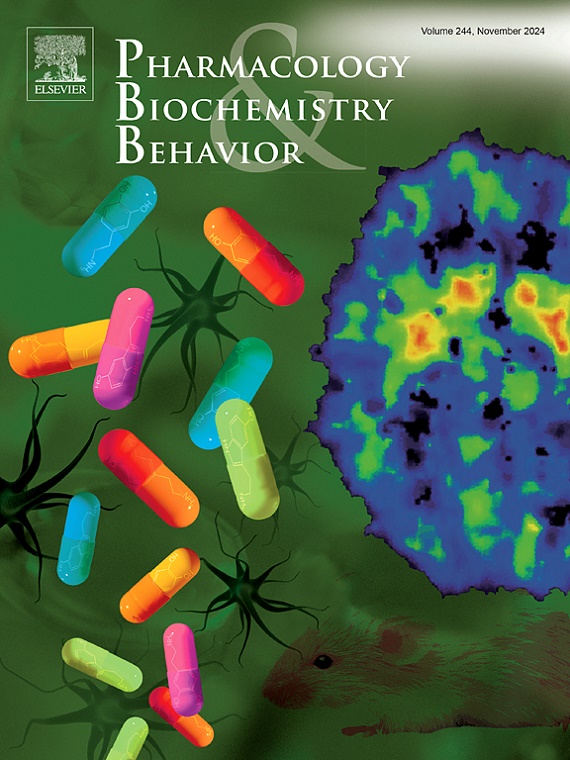Mu-opioid receptor knockout on Foxp2-expressing neurons reduces aversion-resistant alcohol drinking
IF 3.3
3区 心理学
Q1 BEHAVIORAL SCIENCES
引用次数: 0
Abstract
Mu-opioid receptors (MORs) in the amygdala and striatum are important in addictive and rewarding behaviors. The transcription factor Foxp2 is a genetic marker of intercalated (ITC) cells in the amygdala and a subset of striatal medium spiny neurons (MSNs), both of which express MORs in wild-type mice and are neuronal subpopulations of potential relevance to alcohol-drinking behaviors. For the current series of studies, we characterized the behavior of mice with genetic deletion of the MOR gene Oprm1 in Foxp2-expressing neurons (Foxp2-Cre/Oprm1fl/fl). Male and female Foxp2-Cre/Oprm1fl/fl mice were generated and heterozygous Cre+ (knockout) and homozygous Cre− (control) animals were tested for aversion-resistant alcohol consumption using an intermittent access (IA) task, operant responding for a sucrose reward, conditioned place aversion (CPA) to morphine withdrawal, and locomotor sensitization to morphine. The results demonstrate that deletion of MOR on Foxp2-expressing neurons renders mice more sensitive to quinine-adulterated alcohol. Mice with the deletion (vs. Cre− controls) also consumed less alcohol during the final sessions of the IA task, were less active at baseline and following morphine injection, and there was a trend toward less responding for sucrose under an FR3 schedule. Foxp2-MOR deletion did not impair the ability to learn to respond for reward or develop a conditioned aversion to morphine withdrawal. Together, these investigations demonstrate that Foxp2-expressing neurons may be involved in escalation of alcohol consumption and the development of compulsive-like alcohol drinking.
表达foxp2的神经元上的mu -阿片受体敲除可减少厌恶性饮酒。
杏仁核和纹状体中的mu -阿片受体(MORs)在成瘾和奖励行为中起重要作用。转录因子Foxp2是杏仁核嵌入细胞(ITC)和纹状体中棘神经元(msn)亚群的遗传标记,这两种细胞在野生型小鼠中都表达MORs,并且是与饮酒行为潜在相关的神经元亚群。在目前的一系列研究中,我们对表达foxp2的神经元(Foxp2-Cre/Oprm1fl/fl)中MOR基因Oprm1基因缺失小鼠的行为进行了表征。我们培育了雄性和雌性Foxp2-Cre/Oprm1fl/fl小鼠,并通过间歇性进入(IA)任务测试了杂合Cre+(敲除)和纯合Cre-(对照)动物的厌恶性酒精消耗,对蔗糖奖励的操作性反应,吗啡戒断的条件性地方厌恶(CPA)以及吗啡的运动致化。结果表明,foxp2表达神经元上MOR的缺失使小鼠对奎宁掺假酒精更敏感。缺失小鼠(与Cre对照组相比)在IA任务的最后阶段也消耗更少的酒精,在基线和吗啡注射后更不活跃,并且在FR3计划下对蔗糖的反应也有减少的趋势。Foxp2-MOR缺失并没有损害学习对奖励作出反应的能力或对吗啡戒断产生条件厌恶的能力。总之,这些研究表明表达foxp2的神经元可能参与了酒精消耗的增加和强迫性饮酒的发展。
本文章由计算机程序翻译,如有差异,请以英文原文为准。
求助全文
约1分钟内获得全文
求助全文
来源期刊
CiteScore
6.40
自引率
2.80%
发文量
122
审稿时长
38 days
期刊介绍:
Pharmacology Biochemistry & Behavior publishes original reports in the areas of pharmacology and biochemistry in which the primary emphasis and theoretical context are behavioral. Contributions may involve clinical, preclinical, or basic research. Purely biochemical or toxicology studies will not be published. Papers describing the behavioral effects of novel drugs in models of psychiatric, neurological and cognitive disorders, and central pain must include a positive control unless the paper is on a disease where such a drug is not available yet. Papers focusing on physiological processes (e.g., peripheral pain mechanisms, body temperature regulation, seizure activity) are not accepted as we would like to retain the focus of Pharmacology Biochemistry & Behavior on behavior and its interaction with the biochemistry and neurochemistry of the central nervous system. Papers describing the effects of plant materials are generally not considered, unless the active ingredients are studied, the extraction method is well described, the doses tested are known, and clear and definite experimental evidence on the mechanism of action of the active ingredients is provided.

 求助内容:
求助内容: 应助结果提醒方式:
应助结果提醒方式:


